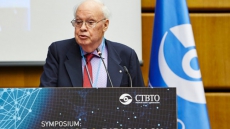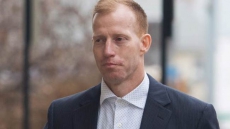TORONTO — A recent controversy involving an Ontario-based software company losing access to Twitter because of its marketing practices is just one salvo in an ongoing battle around online privacy, analysts say.
Experts are divided on whether actions taken against Media Sonar of London, Ont., were justified, but are united in the view that the case highlights the elusive balance between public safety and basic privacy rights.
Media Sonar touts its social media monitoring software and algorithms as ideal tools for police and corporations to aggregate and filter data to improve safety and protect corporate assets.
But a U.S.-based investigation turned up marketing language that ran afoul of Twitter's policies, which state that posts on the popular social network should not be mined for surveillance purposes.
Media Sonar's emails to past clients explicitly stated that the software, which allows officers to comb through publicly available posts on the likes of Twitter and Instagram, could help police search for "criminal activity" and "avoid the warrant process" when flagging people who have come under scrutiny.
Twitter responded by cutting off the company's access to its application program interface (API), saying its policies explicitly state that no third party can make use of Twitter data for surveillance purposes.
Media Sonar did not respond to requests for comment.

Analysts agree that Twitter's stance will do little to limit surveillance on its own, since numerous products on the market perform the same function.
They anticipate, however, that Media Sonar will be one of many companies to find themselves caught in the crosshairs of an increasingly complex and heated debate.
Tamir Israel, staff lawyer with the Canadian Internet Policy and Public Interest Clinic, said there's a disconnect between what law enforcement feels it's entitled to do with data and what citizens believe may be happening.
"The challenge is that our privacy norms have not necessarily caught up to this new and dynamic environment," Israel said. "A lot of this social media monitoring occurs in kind of a grey area."
Many people contend that third parties have every right to comb through data that's been shared voluntarily on platforms widely known to be public.
Information such as hashtags and geolocation tags, they argue, can be invaluable investigative resources to police.
Ryan Duquette, who runs digital forensics company Hexigent, believes Twitter's actions against Media Sonar were misplaced.
He contends the onus is on individuals to control the content they make available online, not on companies to curtail the use they make of publicly available data.
He argues that while companies ranging from tech providers to public relations firms routinely dive into the "treasure trove" of publicly available data, he argues that law enforcement agencies have a particularly compelling reason to do so.
"Everybody else wants that immediate information," he said. "Law enforcement is no different, except they're using it for public safety, not to market the latest and greatest coffee to somebody."
Privacy advocates acknowledge that police forces have valid reasons for combing through data, but caution that current techniques can be more insidious than they first appear.
Israel said most social media monitoring companies rely on algorithms to parse the vast amount of data and pull out meaningful information for clients. Those algorithms, he cautioned, can be misleading.
Israel said they often analyze posts out of context and are unable to account for slang, cultural norms or other factors that give a post meaning.
He cited a recent example of a British tourist who tweeted about his intention to "destroy the United States" on an upcoming trip. His post raised alarm bells with U.S. security, but the tourist had been trying to express his plans to party while abroad using common British slang.
Israel also raised the spectre of facial recognition technology, which can extract images from photographs of people who were merely caught in the background of public photos and had not shared the pictures themselves. Such software, which he said is already in use, could result in police creating profiles on unsuspecting people.
Such concerns were at the heart of the issues raised about Media Sonar.
The American Civil Liberties Union of Northern California released 88 pages of documents, some of which disclosed emails and budgetary proposals from Media Sonar. They also wrote a blog post sounding an alarm about the company and others like them, saying unchecked mining of social media information risks violating civil liberties on a large scale.
"Social media monitoring is part of a pattern of unchecked surveillance," the post read. "It's yet another surveillance tool being used without transparency or accountability. And it risks targeting communities that are already vulnerable to police misconduct – especially communities of colour."
Chris Parsons, researcher at the University of Toronto's Citizen Lab, said privacy laws in Canada offer a little more protection than those in the U.S.
He said law enforcement and federal agencies must demonstrate a need for mining online data, adding that they cannot look through material indiscriminately.
"Just because I say something on Twitter doesn't mean the RCMP can hoover it up," he said. "There has to be a reason, and they have to be able to articulate it."
Parsons sees the Media Sonar case as symptomatic of an ongoing struggle, one that's nowhere close to being resolved.




